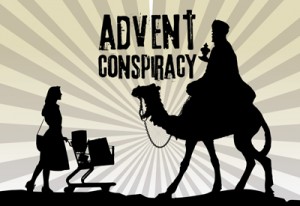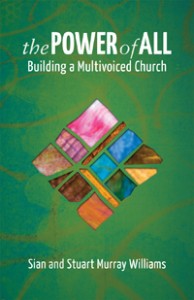
Below you'll find the text of the message from yesterday's gathering in which we looked at the theme of Worship Fully from the Advent Conspiracy series that we just started. The discussion questions that we talked about follow the message.
So today we are starting a new series. The new series corresponds with the 4 weeks of advent and is called Advent Conspiracy. For those who don’t know Advent is the 4 weeks before Christmas. Advent is a season observed in many Western Christian churches as a time of expectant waiting and preparation for the celebration of the Nativity of Jesus at Christmas. The term is an anglicized version of the Latin word adventus, meaning "coming.” So for the next 4 weeks we will be looking at Advent and wait to celebrate the coming of King Jesus, born in a lowly manager in an out of the way town in the corner of the Roman Empire. We will seek to untangle the cultural celebrations of Advent from the Biblical.
We will focus on four broad themes. This week we will start off advent in the right way by focusing on worship fully. To untangle ourselves from the cultural expectations of this season, we will need to be spending time worshipping Jesus, the real reason for the season. Next week we will look at spending less. The average American spends somewhere around 1,000 dollars on Christmas each and every year. In 2010 Americans spent 450 billion on Christmas. So we’ll also seek to untangle our celebrations by spending less. The 3rd week we’ll look at what might sound like an exact opposite of the week before. The 3rd week theme is Give More. We’ll be talking about giving more presence than presents. More time with people and also giving more away to those in need. Lastly, we’ll warp up the Advent season with the theme of Love All. If we worship fully, spend less, and give more but don’t do it from a heart of love, than it is all for naught. So my prayer for us is that we would, in a small part, recover the conspiracy that is Advent. Recover the subversive nature of Christmas and the upside down Kingdom that worships a King that doesn’t come with pomp and circumstance but comes to lowly parents. Not with a silver spoon in his mouth, but lying in a feed trough.
So let’s begin unpacking what it means for us as we begin Advent to worship fully. We’ll look at probably the two most familiar stories of the coming of Jesus into our world. We’ll also draw out 6 principles of what it means to worship fully.
So let’s turn to our first text of the morning, Luke 2:8-20. And there were shepherds living out in the fields nearby, keeping watch over their flocks at night. An angel of the Lord appeared to them, and the glory of the Lord shone around them, and they were terrified. But the angel said to them, “Do not be afraid. I bring you good news that will cause great joy for all the people. Today in the town of David a Savior has been born to you; he is the Messiah, the Lord. This will be a sign to you: You will find a baby wrapped in cloths and lying in a manger.” Suddenly a great company of the heavenly host appeared with the angel, praising God and saying, “Glory to God in the highest heaven, and on earth peace to those on whom his favor rests.” When the angels had left them and gone into heaven, the shepherds said to one another, “Let’s go to Bethlehem and see this thing that has happened, which the Lord has told us about.” So they hurried off and found Mary and Joseph, and the baby, who was lying in the manger. When they had seen him, they spread the word concerning what had been told them about this child, and all who heard it were amazed at what the shepherds said to them. But Mary treasured up all these things and pondered them in her heart. The shepherds returned, glorifying and praising God for all the things they had heard and seen, which were just as they had been told.”
So the first thing that we can draw from this text in relation to the idea of worshipping fully is found in verse 15. After the angels left and went back into heaven, the shepherds now had a choice to make. Do they continue watching the sheep on the hillside, or listen to the Angels and seek out Jesus. Obviously if a company of angles shows up and tells you some amazing news, your choice would be pretty obvious. So the Shepherds set off and began to seek out Jesus in the town of Bethlehem. So to worship fully in our day and age is no different, in some respects to what the shepherds did after the angels appeared to them. We need to seek after Jesus just as the shepherds did. Seeking after Jesus in our day and age means to spend time seeking Jesus in the Scriptures and in prayer, both individually, but also corporately. It wasn’t like the shepherds said, “Let’s designate one of us to go and seek Jesus, while the rest of us stay here and keep watch over the flocks.” They all went and they all searched together.
So our Veritas community needs to seek after Jesus together not only in this advent season but all year round. Everyone taking time to pray, read, and seek God on a daily basis. But also getting together to search the Scriptures, pray together, and seek Jesus together.
The second thing that we can relate to our theme of worship fully from this text is found in verse 17. Not only did the Shepherds seek after Jesus, they also turned around and shared what they had found. Scriptures say that “they spread the word concerning what had been told them about this child.” Worshipping fully not only means seeking Jesus in prayer, scripture, etc…. but it means then taking what you find into the world and sharing it with others. The really amazing thing about this part of the text is who God uses to spread his message. Shepherds were regarding as social outcasts. They had a bad reputation and were considered unreliable and were not allowed to give testimony in the law courts. But here God was redeeming them and spreading the kingdom through the most unlikely of people. In a very real way the shepherds were the first preachers and missionaries of the gospel of Jesus. They didn’t and they couldn’t keep it to themselves and when we worship fully we shouldn’t be able to keep it to ourselves either.
The last thing we can draw out from the story in relation to worshipping fully is found at the end of the story. What happens when they leave Bethlehem? They returned to their flocks, their vocation and their families glorifying and praising God for everything that had seen and heard and experienced. They didn’t just stay in Bethlehem. They didn’t just stay on the mountaintop, if you will. They came off the mountaintop experience of seeing and experiencing the birth of the savior of the world, and continued worshipping and praising God in the midst of their daily routine and life. The same needs to be said of us. We are so often tempted to try to stay on the mountaintop. You know those times when God shows up in an amazing way, and we just want to stay there and never come down. We don’t want to go back to our jobs, families, school, neighborhood, etc… But life is lived off the mountain, and I believe true worship is the kind of worship that is fleshed out and lived in the everyday and the ordinary. In the times when you don’t “feel it”. So to worship fully means that true worship is not just music, a gathering, an emotion, etc… but true worship is probably best described by Romans 12:1-2 (The Message), “So here’s what I want you to do, God helping you: Take your everyday, ordinary life—your sleeping, eating, going-to-work, and walking-around life—and place it before God as an offering. Embracing what God does for you is the best thing you can do for him. Don’t become so well-adjusted to your culture that you fit into it without even thinking. Instead, fix your attention on God. You’ll be changed from the inside out. Readily recognize what he wants from you, and quickly respond to it. Unlike the culture around you, always dragging you down to its level of immaturity, God brings the best out of you, develops well-formed maturity in you.”
So let’s turn to the next story and see what it has for us in relation to our first theme of the Advent Conspiracy, that of worshipping fully. The text is found in Matthew 2:1-11 and is the story of the Magi coming to Jesus. “After Jesus was born in Bethlehem in Judea, during the time of King Herod, Magi from the east came to Jerusalem and asked, “Where is the one who has been born king of the Jews? We saw his star when it rose and have come to worship him.” When King Herod heard this he was disturbed, and all Jerusalem with him. When he had called together all the people’s chief priests and teachers of the law, he asked them where the Messiah was to be born. “In Bethlehem in Judea,” they replied, “for this is what the prophet has written: “‘But you, Bethlehem, in the land of Judah, are by no means least among the rulers of Judah; for out of you will come a ruler who will shepherd my people Israel.’ ”Then Herod called the Magi secretly and found out from them the exact time the star had appeared. He sent them to Bethlehem and said, “Go and search carefully for the child. As soon as you find him, report to me, so that I too may go and worship him.” After they had heard the king, they went on their way, and the star they had seen when it rose went ahead of them until it stopped over the place where the child was. When they saw the star, they were overjoyed. On coming to the house, they saw the child with his mother Mary, and they bowed down and worshiped him. Then they opened their treasures and presented him with gifts of gold, frankincense and myrrh. And having been warned in a dream not to go back to Herod, they returned to their country by another route.”
The first thing that we can draw from this text regarding worshipping fully can be drawn from what might seem like an incidental detail, the place of Jesus’ birth. Bethlehem can be broken down into two words in the Arabic language. First there is Beth which means house. Secondly there is Lehem which means flesh. So Bethlehem can mean the house of flesh. Or it could be called the House of the Incarnation. The place where God was manifested in the flesh for the salvation of a lost world. So part of worshipping fully, not only in this advent season, but also all year round, is incarnating Jesus in our world. Be the hands and feet of Jesus wherever you are. We are called to be incarnational in our community, in our work, in our school, in our families, wherever we go. To flesh out the Kingdom in the world. Or I could ask each one of us, where is our Bethlehem, where we flesh out the life of Jesus? To worship fully we need to be incarnational.
We also see in verse 2 that the purpose of the visit of the Magi was “to come to worship him.” The Magi, wise man from the east, coming to worship a child, who had been born in a manger, not in a palace. They understood their purpose. Do we? Do we understand that our overarching purpose is to worship him and that everything we do can be worship? We talk about this every week when we do the triangle, that they are totally connected and in all of those 3 areas we are really worshipping Him.
Part of the way the Magi’s expressed the purpose of worship, was what they did when they found Jesus. The gave him gifts of gold, frankincense and myrrh. These were things that were highly valuable in their country, and they gave them as an act of worship. It again is no different for us, it might not be gold, frankincense, and myrrh that we are called to worship Jesus with. It might be our money, our time, our talents, and our abilities. Part of worshipping fully is what we call stewardship. God calls us to give back in worship what he has entrusted to our care. God calls us to be generous, just like the Magi were generous. Generous in our finances, in our time, in our relationships, and in every part of our lives. When we are generous than we are worshipping fully.
Finally, the last of the six principles we can draw about worshipping fully from this text is found in the last verse, verse 11. The Magi were warned in a dream about Herod’s true intentions, and they were obedient to that dream. Their worship went beyond their purpose in the trip, and the gifts that they gave Jesus. Their worship was also manifested in obedience. They were obedient to what God had communicated to them through a dream. Worshipping God fully means obedience to his will in all of life. Jesus said it himself in the last thing he said before returning to his father, “Therefore go and make disciples of all nations, baptizing them in the name of the Father and of the Son and of the Holy Spirit, and teaching them to obey everything I have commanded you.” A Dallas Willard said it this way in The Great Omission, “life in Christ has to do with obedience to his teaching.”
So we are going to spend sometime unpacking this idea of worship fully, especially in the midst of advent, by asking a few questions about what it looks like in the everyday and ordinary of all of our lives.
1. What thoughts, comments, insights, questions, push back, etc… do you have regarding the Scriptures and/or the message?
2. Out of the 6 principles of worshipping fully found in the two Scriptures (Seeking, Spreading the word, Life as Worship, Incarnating Jesus, Stewardship, and Obedience) do you have the most trouble living out? What can you do during this Advent season to grow in that area?
3. How might starting Advent by talking about worship fully and Jesus, change or influence what you do and don’t do this Christmas Season?
4. What is God saying to you and what are you going to do about it? What is God saying to us and what are we going to do about it?
 Light in the Midst of Darkness
Light in the Midst of Darkness








